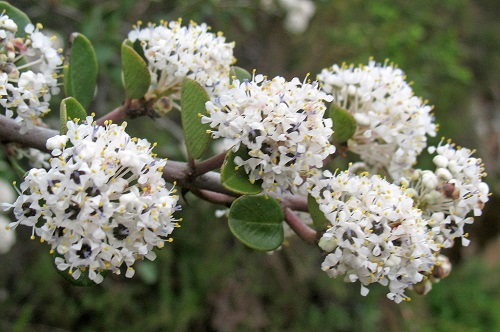Buck brush, or buckbrush, is one of California’s loveliest native flowering shrubs. It blooms in white, fuchsia, pale violet and the intense violet-blue shade that inspired the alternate names Wedgeleaf Mountain Lilac and California Lilac. The deepest blue blooms resemble blue hydrangeas. It can get bushy quickly and grow as tall as ten feet, so it should be cut back after the flowers die and the seed pods open in the fall or winter.
Buck Brush: The Basics
Buck brush is ideal if you’re looking for a fragrant, flowering shrub that comes in a variety of colors and is drought resistant. Several shrubs that are tasty to deer are casually referred to as buckbrush. This article is about Ceanothus cuneatus. It is not palatable to deer. Buck brush is a California native and one of our best-known wild flowering shrubs.
Buck brush is an evergreen, so it will still dress up your yard after it stops blooming. Buck brush is highly attractive to pollinators. Several varieties of butterflies favor buck brush. Hummingbirds are also drawn to buck brush’s fragrant blossoms. By planting it, you’ll be feeding bees and butterflies as well as beautifying your lawn. Buck brush is one of the most popular plants in California butterfly gardens.
Landscaping with Buck Brush
Ceanothus cuneatus is versatile and requires little more than sun and sandy, loose soil that drains. It’s available in so many shades of white and purple that you can choose white or pale violet and use it as a background shrub, or you can pick a couple of the more vivid shades and build flower gardens or hardscapes around them. You can line your driveway or porch with a soft shade and flank your porch steps with the intense lilac purple.
Bright shades are stunning at night when highlighted by solar lights. Plant the most colorful buck brush around your patio. Enjoy your butterfly and hummingbird garden during the day, and then wow your guests in the evening with buck brush’s natural beauty and fragrance. For an indoor or outdoor centerpiece, cut a few long branches that have just started to flower.
If you want a dedicated butterfly garden in your yard, you’re going to need other pollinator-attracting plants like scrub oak, and you’ll need a butterfly puddle. Butterflies need a puddle in mud or sand where they can drink water and obtain minerals, specifically salt, not found in flower nectar. Creating a butterfly puddle is easy. Find a clay dish that doesn’t drain. Dig a hole just deep enough to hold the dish with the edges even with the dirt. Follow the instructions in this article to make your butterfly puddle perfect. You can make a partial circle of buck brush and place your butterfly puddle in the center.
Things to Remember
• Buck brush comes in a color range from white to bright purple
• It has a strong, pleasant fragrance
• It’s drought resistant
• Deer don’t like it
When you’re ready to make your yard colorful and fragrant with Ceanothus cuneatus, fill out our contact form or call at 805-773-5395. We can design dramatic hardscapes for you, edge your patio and walkway with buck brush or even create a butterfly and hummingbird garden. Tired of your dry, boring lawn? Give buck brush a try.

